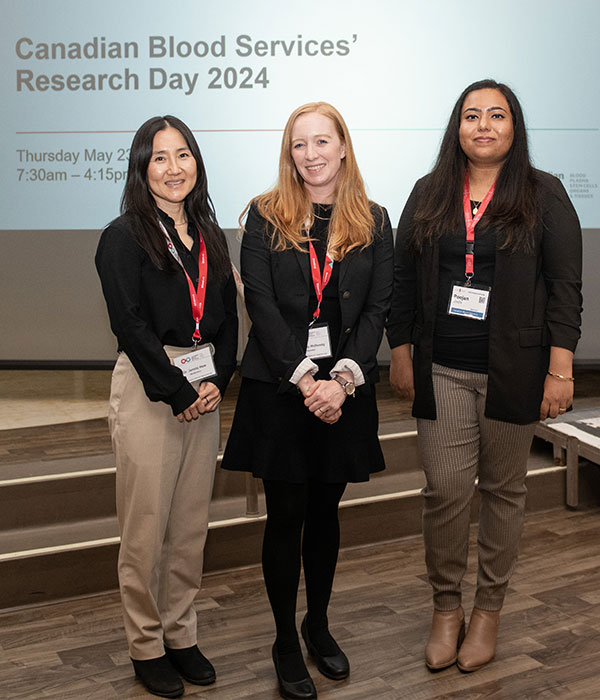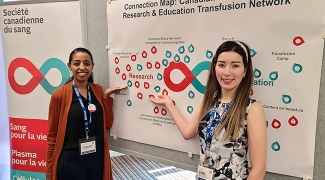CSTM 2024: Reflections from Canadian Blood Services trainees, part 2
Tuesday, July 16, 2024 Poojan Joshi
The Canadian Society for Transfusion Medicine (CSTM) annual conference, held in partnership with Canadian Blood Services and Héma-Québec, took place on May 23-26, 2024, in Saskatoon with the theme of “Bridging transfusion communities.”
Coinciding with CSTM, Canadian Blood Services' annual Research Day also provided a chance for Canadian Blood Services’ extended research network to collaborate, share their research, and connect. Following these events, we asked Canadian Blood Services research trainees to reflect on their experiences and key learnings from the event.
This blog was prepared by Poojan Joshi, a research assistant working with Canadian Blood Services social scientists Drs. Jennie Haw and Kelly Holloway.

What was it like attending your first Canadian Blood Services Research Day and CSTM conference as a research assistant?
Attending CSTM 2024 for the first time (it was also my first conference ever!) as a social science research assistant was an incredible experience for many reasons. As I listened to the various presentations and engaged with experts in the field, I was struck by the vast array of knowledge and experience attendees brought to the field of transfusion medicine. I was also humbled by the multidisciplinary collaborations that go into building and maintaining an efficient blood system.
My background includes training in social psychology and qualitative research methods from the University of Guelph, where I developed interest in areas such as health, immigration and refugees, public and media discourse and policy. In December 2022, I had the opportunity to work on a social science research project with Dr. Kelly Holloway and Dr. Jennie Haw titled “Addressing Systemic Barriers to Donation for Donors of African and South Asian Ancestry.” This project aligned very well with my research interests and underscored the importance of applying a broader sociocultural perspective to donation practices and research. I soon realized that my diverse interests were more connected than I had originally thought as I began to understand donation as a complex social act embedded in a wide sociocultural and political context.
This understanding allowed me to view the presentations, posters, and plenary sessions of Research Day and CSTM 2024 through a social science lens. In doing so, I appreciated the impact that social science has on many aspects of the blood system, from donor to recipient, and the critical role it plays in addressing current and future complex challenges.
“Since joining Canadian Blood Services as a full-time research assistant in September 2023, I’ve gained a deeper understanding of the role of social science in transfusion medicine.
Under the excellent mentorship of Drs. Kelly Holloway and Jennie Haw, I have developed a profound appreciation for the intersection of these fields and the critical insights social science can bring to transfusion medicine.”
Thinking about Research Day specifically, what learnings or ideas have the presentations sparked for you?
Dr. Chantale Pambrun’s opening remarks highlighted the importance of the blood operator and how research plays a crucial role in improving transfusion medicine and health, as well as several challenges and opportunities ahead. One significant area where social science has played a key role is in donor policies and changes in deferral criteria. Dr. Mindy Goldman’s presentation noted that because donor policies impact blood safety, public perception, and product availability, a multidisciplinary approach is required to balance donor and recipient safety with the maintenance of an adequate supply.
Dr. Kelly Holloway’s presentation on the lived experiences of immunoglobulin recipients demonstrated the importance of incorporating patient stories to advance our understanding of health and inspire positive change. Immunoglobulin products (Ig) are manufactured from plasma and may be needed by patients with immunodeficiencies or autoimmune and alloimmune disorders.
What was the most memorable moment from the CSTM 2024 program this year and what reflections did you take away from it?
Dr. Jennie Haw’s presentation on the systemic barriers to blood donation experienced by donors of African and South Asian ancestry was memorable for me, as it illustrated the strengths and commitment of diverse communities in donating blood and plasma, highlighting the need to address the barriers they face. As I am actively involved in this project, it was powerful to see this perspective of social science shared with experts.
Another memorable session was the plenary on Indigenous health and well-being in Northern Saskatchewan. Presentations by Rena Sutherland, Janet Tootoosis, and Jack Janvier highlighted key considerations for transfusion medicine, such as trust, relationship-building, community engagement, and patient-centred care. They discussed the challenges of providing transfusions in remote areas and emphasized the importance of collaboration, expertise, resources, and clear communication.
The session also addressed the impact of colonialism, including residential schools, ongoing racism, and the exclusion of Indigenous holistic health views to provide guidance on effectively engaging Indigenous communities using a strengths-based approach. Social science research is crucial in these areas as it helps build and maintain trust through community engagement, ensuring inclusive and culturally safe care for donors and recipients.
“My time at CSTM 2024 was more than just an academic exercise; it was a recognition of the inseparability of social science from the field of transfusion medicine. The talks and discussions illustrated how societal factors are connected to health outcomes and donor policies.”
I am excited to carry this knowledge forward to the 2024 International Society of Blood Transfusion conference in June, where I hope to take my learning from a Canadian context and expand it by engaging with international experts in transfusion medicine. By fostering interdisciplinary collaborations and supporting innovative approaches, we can ensure that our blood systems not only operate efficiently but also resonate with the voices and needs of all communities.
Read more about social science and diversity in the blood system in these articles on blood.ca:
- Reducing barriers to blood donation in African, Caribbean and Black communities
- Blood donors mean the world to many with sickle cell disease
- 5 areas a diverse donor base helps save lives (blood.ca)
Canadian Blood Services – Driving world-class innovation
Through discovery, development and applied research, Canadian Blood Services drives world-class innovation in blood transfusion, cellular therapy and transplantation—bringing clarity and insight to an increasingly complex healthcare future. Our dedicated research team and extended network of partners engage in exploratory and applied research to create new knowledge, inform and enhance best practices, contribute to the development of new services and technologies, and build capacity through training and collaboration. Find out more about our research impact.
The opinions reflected in this post are those of the author and do not necessarily reflect the opinions of Canadian Blood Services nor do they reflect the views of Health Canada or any other funding agency.
Related blog posts
Canadian Blood Services research trainees reflect on the 2024 Canadian Society for Transfusion Medicine (CSTM) conference and their experience as planning committee members for Canadian Blood Services’ Research Day.
Canadian Blood Services is looking forward to connecting with members of the transfusion community at CSTM 2024, happening this May in Saskatoon! In this second post in a series of blogs counting down to CSTM 2024, Dr. Jennie Haw shares her insights in lead-up to the event.
Canadian Blood Services supports capacity building in transfusion medicine through the support of research and physician trainees. In this blog, trainees reflect on their experiences attending CSTM 2023 in Montreal.


